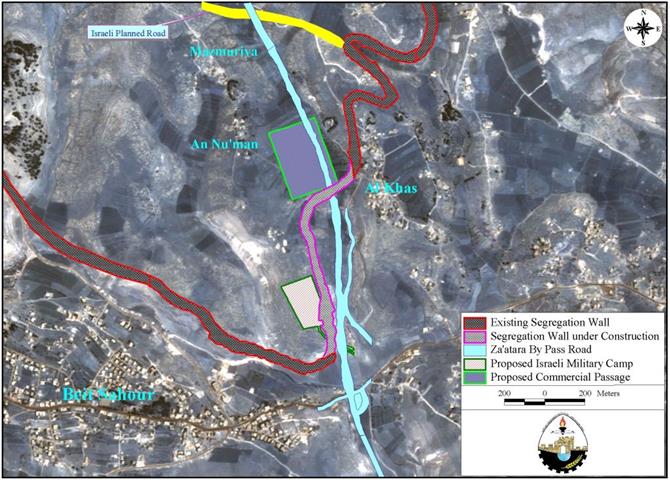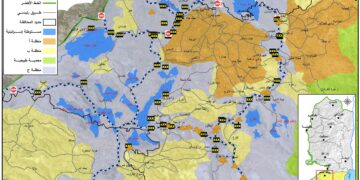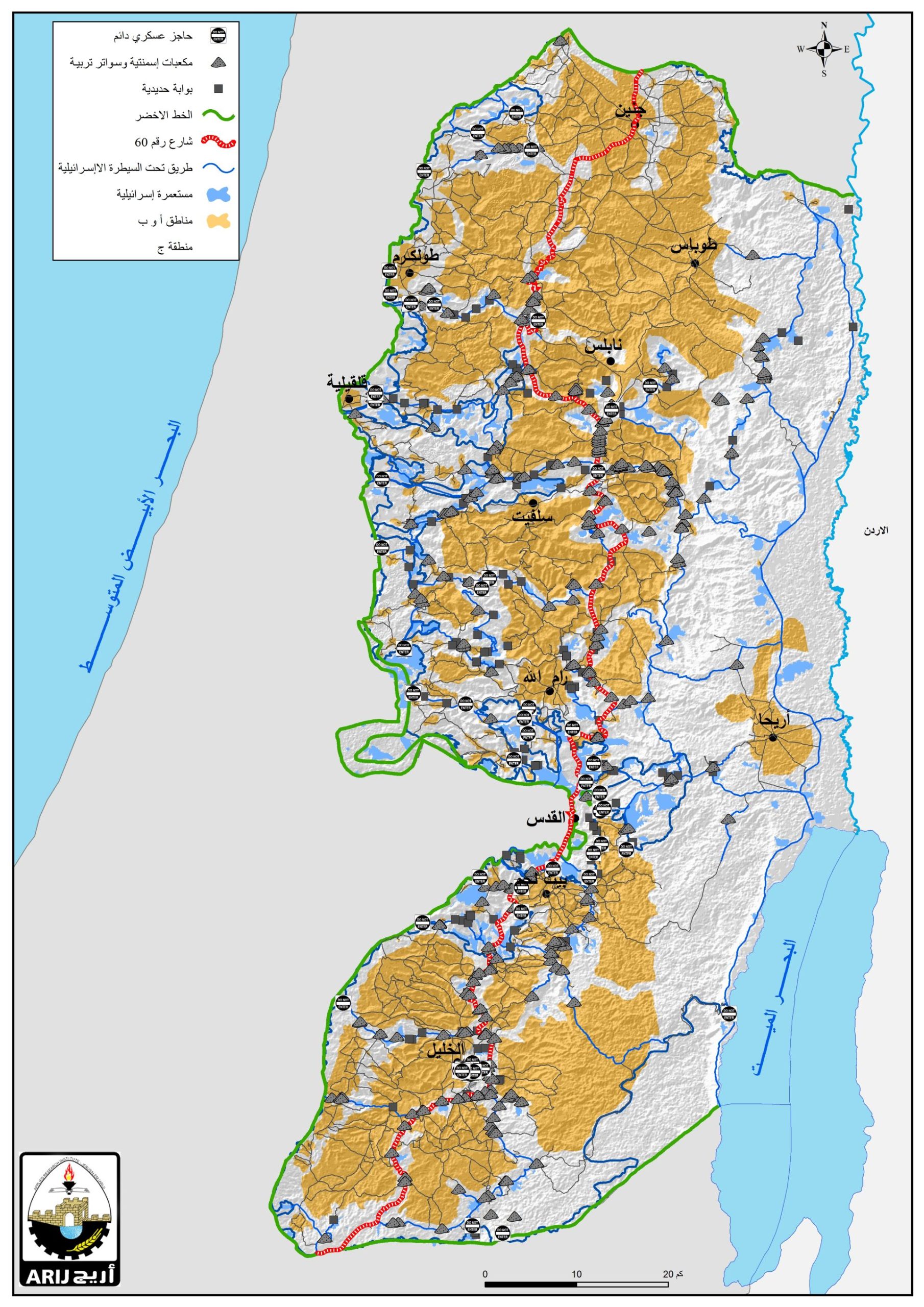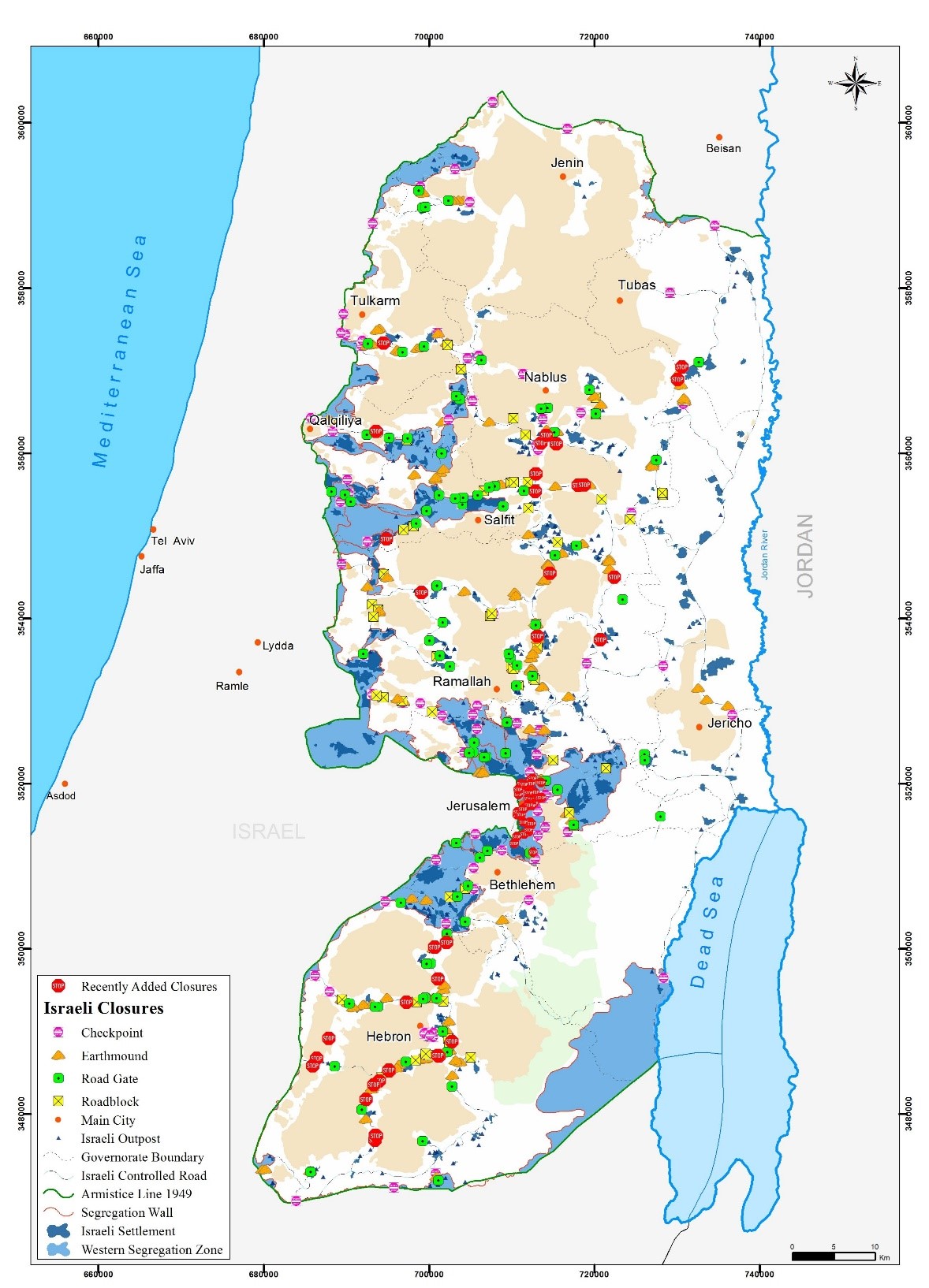Location and historical background
Mazmuria is a small village located on a hill to the south of Jerusalem. It lies next to Al-Nu'man village a few hundred meters north of Beit Sahour in Bethlehem governorate. The village has 200 inhabitants, representing about 20 families. The inhabitants of Mazmuria have titles testifying their ownership of the land from the time of their ancestors who have lived on the land for over 150 years. Mazmuria is named after the Roman ruins in the area.
Israeli officials argue that its Bedouin inhabitants belong to an established clan near the West Bank city of Bethlehem 2 miles away. They say that the 25 homes in the village where Palestinians live were erected illegally because they were built after 1967, when the land was unilaterally annexed to Jerusalem. Although the inhabitants have the West Bank identity cards, most of the village's land is considered a part of the (annexed) Jerusalem municipality.
Adjacent to Mazmuria lays Al Khas and Al Nu'man villages which the Israeli authorities refer to as Khirbet Mazmuria, after some Roman ruins located near the village. Despite the fact that the land of Al-Nu'man was annexed after the 1967 war by Israel, the villagers are considered West Bank citizens and they need special permits to enter Jerusalem.
The Jerusalem municipality has prohibited any construction within the village of Mazmuria since the year 1992. From that day, no new houses could be built legally. The Israeli authorities handed the villagers military orders to prevent them from construction in the area as it was considered a nature reserve. So the villagers never received building permits.
Israel has also prohibited the villagers from benefiting from the Palestinian Authority services as they consider it to be part of Jerusalem. Much more, Israeli forces have uprooted telephone poles provided by the Palestinian Authority in 1998. Now the residents receive drinking water services from the Palestinian Authority through a thin blue pipeline from the neighboring village of Al-Khas.
The Israeli segregation Plans
A new Israeli military order issued on October 2003 shows that Israel is planning to construct a new trade passage between Israel and the southern part of the west Bank on Mazmuria in addition to a new Israeli military camp. The site will be connected through Israeli Za'tara bypass road which is currently under construction, this bypass road will serve also to connect the Israeli settlements located at the eastern side of Bethlehem governorate such as Teqoa to the settlement of Har Homa and Jerusalem. The plan shows that Za'tara bypass road will cross the Palestinian road that leads to the eastern rural areas from Bethlehem through an elevated bridge at the crossing point. A new border check point or a gate is expected to be constructed near the trade passage. Point gates are planned yet in the wall to connect it with nearby towns and villages. See Map of Mazmuria
According to the Israeli Military order, the village of Mazmuria will be totally cut off from the West Bank as the segregation wall will surround it and annex it to Israel. About 280 dunums of the village's land will be confiscated by the Israeli forces for building the segregation Wall, the trade passage, and Israeli Za'tara bypass road. The Israeli forces distributed military orders to the villagers declaring the confiscation of their land. The following table shows the number of the land owners whose land will be confiscated in both Mazmuria and Al Nu'man: Table: Names of the owners
|
OWNER |
OWNER |
|
1. Kokaly Family |
2. Al Hiwari (Bannoura Family) |
|
3. Salamah Al Dar'awi |
4. Al Hirezi |
|
5. Batarsah |
6. Khalil Salman Bannoura |
|
7. Sliman Abu Sita |
8. Mahmoud Al Hakash |
|
9. Musalam (Bannoura Family) |
10. Ahmad Sliman Mustafah, 'Ali Mustafah |
|
11. Khalil Elias Abu Farha |
12. Farah Juha |
|
13. Salama Al Dar'awi Son's |
14. Nakhleh 'Abdalah Al Hiwari |
|
15. Musalam Bannoura Family |
16. Mohamad Al Sabi' |
|
17. Daoud Salamah |
18. Al Hiwari (Bannoura Family) |
|
19 Abu Sitah |
20. Salamah Al Dar'awi |
|
21. Abu 'Ita & his Partners (Al Hireze) |
22. Al Hiwari (Bannoura Family) |
|
2. Khalil Elias Ibrahim |
24. Man'a Al Dar'awi |
|
25 Elias Al Qartah Al Yatem |
26. Al Hiwari (Bannoura Family) |
|
27. Abu Sita Son's |
28. Man'a Al Dar'awi |
|
29. Elias Al Qartah Al Yatem |
30. Al Sabi' |
|
31. Sliman & Salamah Al Dar'awi |
32. Salama |
|
33. Jerees Musalam Bannoura |
34. Wafa Rishmawi |
|
35. Abu Sitah |
36. Abu Sita |
|
37. Abu Sitah |
38. Rishmawi Family |
|
39. Eliya Elias 'Awad |
40. Dr.Tanas |
|
41. Habas Abu 'Ita (Zakhariya Habas) |
42. Toma Bannoura |
|
43. Habas Abu 'Ita (Zakhariya Habas) |
44. Muhamad Salman |
|
45. Ahmad Abu Sitah |
46. Butrus Al ' Abed |
|
47. Ya'qob Al Yahodi |
48. Ibrahim Khamis Hamdan Son's |
|
49. Isaac Family (Hanna Ishaq Mansour) |
50. Qumsieh |
|
51. 'Abed Shahin |
52. Abu Sitah |
|
53. Khalil Ibrahim Musleh |
54. Rishmawi Family |
|
55. Jad Isaac |
56.'Ali Salem Al Dar'awi Son's |
|
57. Rasheed Shahin |
58. Mohamad Ramadan Jubran , Ahmad Sliman |
|
59. 'Issa 'Awad Al Khoury |
60. Abu Farda Hamad Al Dar'awi |
|
61. 'Issa Mansour ('George Khalil Mansour |
62. Farah Gharib |
|
63. Slama Al Dr'awi |
64. Sliman Al Dar'awi |
|
65. Khalil Shahin |
66. Al Sus Family |
|
67. Butrus Al 'Abed & his Brothers |
68. Abu Sita |
|
69. 'Issa Mansour ('Issa Isaac Mansour |
70. Al Sus Family |
|
71. 'Issa Mansour ('Issa Isaac Mansour |
72. Salamah Al Dar'awi |
|
73. Slama Al Dr'awi |
74. Sliman |
|
75. Jum'ah Shahin |
76. Abu Sita |
|
77. Sliman's Sons |
78. Muhamad Salim Hamdan |
|
79. Khalil Isaac (George Isaac Mansour) |
80. Khader Hamdan Bargash |
|
81. Sleman Al Dr'awi |
82. Salah Hamdan |
|
83. 'Ied Shahin |
84. Musa Mahmoud Son's |
|
85. Al Sab'i & Al Thiwieb |
86. Sliman Al Dar'awi |
|
87. Awqaf(Islamic) |
88. Fareed Musleh & His Brothers |
|
89.'Umr Abu Sita |
90. Fareed Musleh & His Brothers |
|
91. Mahmoud Al Atrash & His Brothers |
92. Khalil Ibrahim Musleh |
|
93. Khalil (george Mansour) |
94. Khalil Ibrahim Musleh |
|
95. 'Issa Mansur |
96. Khalil Ibrahim Musleh |
|
97. Qumsieh |
98. Mohamad Salim Al thwiab |
|
99. Khalil Ibrahim Misleh |
100. Fareed Misleh |
|
101.Hanna Isaac |
102. Khalil Ibrahem Misleh |
|
103. Al Khouri Rishmawi |
104. Nakhleh 'Abdalah Al Hiwari |
|
105. Khalil Ibrahim Musleh |
106. Mohamad Al Sabi' |
|
107. Mahmoud Al Atrash & His Brothers |
108. Nakhleh 'Abdalah Al Hiwari |
|
109. Al Hirezi |
110. Abu Sita Son's |
|
111. Al Hiwari Saba |
112. Warshit Al Atrash |
|
113. Qumsieh |
114. Man'a |
|
115. Bajis Al Himedi |
116. (Al Hiwari ) Bannoura Family |
|
117. Al Hiwari |
118. Farah Juha |
|
119. Muhamad Musa Salamah Hamad |
120. Ibrahim Al Dar'awi |
|
121. George Bannoura |
122. Grave Yard |
|
123. Al Hiwari |
124. Al Hiwari (Bannoura Family) |
|
125. Elias Abu Hashish |
126. Nakhleh 'Abdalah Al Hiwari |
|
127. George Bannoura |
128. Al Hiwari (Bannoura Family) |
|
129. Mohamad Ramadan Jubran , Ahmad Sliman |
|
Impact of the segregation wall
Enclosing the village with a segregation Wall will negatively affect all aspects of life. Socially, it will impose hard restrictions on the movement of villagers into and out the village and will prevent the villagers from accessing to other towns and villages for shopping, work or other social activities. Most important, students will not be able to pass to their schools located in the neighboring cities such as Bethlehem, and Beit Sahour and people will need special permits to access Mazmuria which are very difficult to obtain because of the Israeli military inflexible requirements for issuing such permits.
By constructing the segregation wall, Mazmuria inhabitants as well as many agricultural land owners in the vicinity and currently live in Beit Sahour and Bethlehem will not be able to access to or out of the village to plant or harvest their fields. It became apparent that the situation resulting from this most recent Israeli land grab and segregation of Palestinian lands will lead to many economic, social, and urban problems, resulting in an increase in the poverty rate and an indirect transfer of the population.
Much more, segregating Mazmuria will have a negative impact on the Palestinian tourism sector since Mazmuria has its unique touristy value, and tourists who intend to visit this historical site will be denied access from the city of Bethlehem.
The memorandum of Sharm el-Sheikh states that:
'Termination of all claims or states of belligerency and respect for and acknowledgment of the sovereignty, territorial integrity and political independence of every state in the area and their right to live in peace within secure and recognized boundaries free from threats of acts of force.'
The International Committee of the Red Cross stated also that the right of freedom of movement to all people should be respected and people should be able to move freely from one place to another without delay or humiliation. Therefore, the Israeli confiscation of the Palestinian land in Mazmuria is against UN Resolutions related to the occupied Palestinian Territory, the international law, and the signed Oslo agreements.
Prepared by:
The Applied Research Institute – Jerusalem













